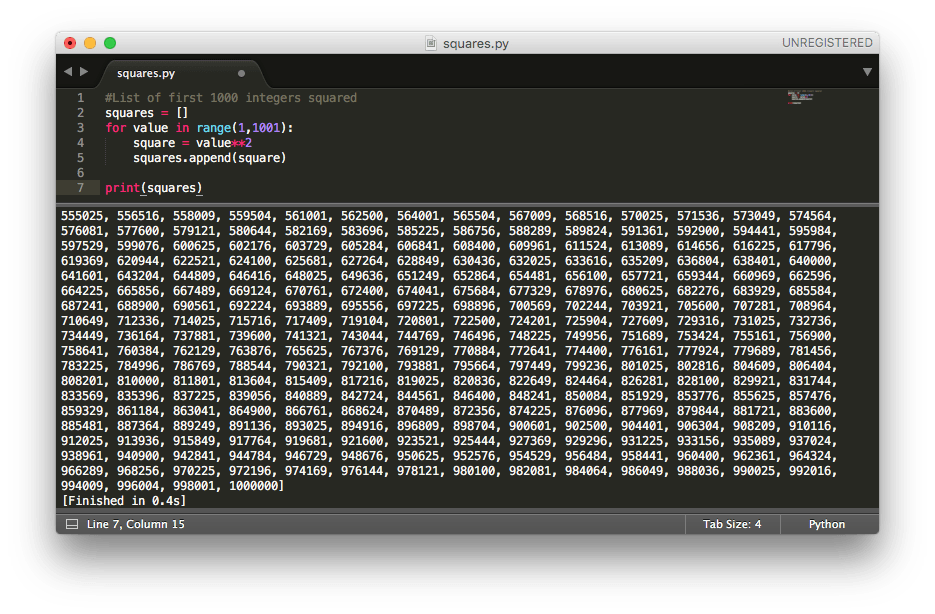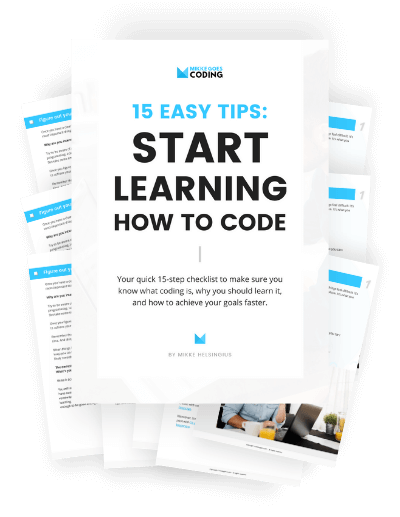What is programming and web development?
Code is everywhere you look and it’s not going anywhere anytime soon.
Learning how to code will help you understand how the tech-filled world around us works. You’ll learn how to use computer technology to create valuable solutions to real-life problems.
And while you’re helping others by building practical solutions with code, you’ll also open doors to incredible career opportunities in the future.
But here’s the best part:
You can teach yourself to code faster than you’d expect.
And even though coding skills are an insanely valuable skill in the job market, you can learn them on a shoestring budget.
All you need to succeed in learning to code is:
- A strategic learning plan
- A good amount of determination
- The best hand-picked learning resources
But before we dive into learning coding in practice, this part of my Free Coding Guide will teach you what coding is all about. You see, coding can mean lots of different things, depending on the context.
Free Guide: Contents
- What is coding?
- Intro to programming languages
- Front-end and backend
- How does the Internet work?
- Useful tools for coding
- Computer Science fundamentals
What does “coding” mean exactly?
Coding – or computer programming – is not just some cryptic work done by superhuman developers who live in their caves filled with humming servers.
When it comes to what coding really means, here’s what you should know:
Computer programming or coding is simply telling a computer what it should do for you.
Hence, a piece of computer code is a set of individual instructions and statements. And just like in a spoken language, each statement tells the computer to perform a very specific task.
In other words, these individual statements tell the computer very precisely what to do.
The computer then follows each instruction exactly as it is written.
That said, any set of instructions makes up a computer program.

Why should you learn to code? Why are tech skills in such high demand?
Why should you learn computer programming?
Why is everyone so hyped about coding these days?
And why do developers get paid such insanely high salaries?
The secret lies in what computers can do for you.
You see, no matter how simple or complex your programs are, your computer will always do its best to run them. Computers don’t get tired or take sick days off from work.
But here’s the catch:
Computers are stupid. Yep, that’s right!
They only know how to follow your instructions in your code exactly how it’s written.
If there is a typo on your code, the computer won’t know what to do. Your program won’t run and you will get an error message.
That’s when your program has a bug in it.
Your computer doesn’t have any common sense to solve your mistakes by itself. It doesn’t have a mind of its own.
Remember: computers only do what we tell them to. To fix a typo in your code, you would need to write another program where you instruct the computer how to do it.
One of the best ways to save time as a programmer is to pay careful attention to detail. The best bug is the one you can avoid altogether!
Thus, when it comes to computer code, you need to make sure you write your instructions correctly.
What can you use computer code for?
You can use coding for perform a huge variety of tasks these days. Almost all electronic devices have computers inside: your phone, your TV – even your fridge and your washing machine!
What makes computer code so awesome is this: it can solve difficult problems for us and make our lives easier.
For example, think of your daily routines. Code and computer programs can:
- Help you find a restaurant
- Connect you to your friends
- Allow you to shop online
- Learn new skills on the WWW (!)
But why do we use code everywhere?
Why is computer code everywhere?
What makes code and programs so insanely powerful is this:
Computers can process individual instructions at lightning speed.
When you run a program on your computer, the processor performs thousands of tiny, individual tasks in the blink of an eye.
For example, let’s say you want to execute a program. You press Enter to tell your computer to run it.
Whether your program has 1,000 or 10,000 instructions, your computer will be done before you even lift your finger off the Enter key.
Now, think about how long it would take you to perform 1,000 individual commands. Let’s say you should open the phone book and find all phone numbers in your region that end with the number “8”.
Yaaaaaaaawn!
But a computer can do stuff like this in the blink of an eye. This helps us humans save heaps of time for more important things that really make a difference.
Hence, we use computers because they’re so efficient with tedious multiplications and lookups or going through long lists.
True story:
When I started learning coding with Python, my first Python book ‘Python Crash Course’ had a similar exercise in it. First, I was asked to manually write a list of the first five integers squared. It took me around 15 seconds.
Next, I would tell my computer to perform the same calculation for the first 1,000 integers. It took a total of 0.4 seconds:

Not too shabby!
Summing it up, computers and code can perform tasks for you that would take you ages to finish by yourself.
What is web development?
Even if you are new to coding and tech, you have probably heard about web development and web design.
Is web development also coding?
Web development is one field within the world of tech and coding.
Web developers write computer code and programs to build websites and web applications for the WWW.
These web pages are then accessible worldwide to anyone who has access to the Internet.
(We will cover the differences between the WWW and the Internet later in the guide.)
Web developers use a wide range of different programming languages and technologies in their work.
If you want to focus on web development, how do you know which language to start with?
Luckily, web coding is usually divided into two areas that you might have heard about already:
- Web development or Back-end development:
This is the more technical part of a web project. Back-end developers take care of the parts of a website that are not visible to its users, such as saving and processing data on web servers and in databases. - Web design or Front-end development:
Web designers focus on the visual parts of website projects. They determine how a web page looks and feels to the people who use it. This is the more creative area of these two specializations.
These two fields often overlap, and the terminology is user interchangeably.
If you are not familiar with these two areas yet, don’t worry. We will look at them in more detail later in the front-end and back-end development part of this guide.
What you should know at this point is that web development has a huge job market with lucrative opportunities for skilled programmers.
Thus, if you are interested in starting a new career by learning how to code, learning web development is a good idea. Website skills are always in demand, and you will want to create a portfolio website for yourself regardless of which tech specialization you focus on.
And quite frankly, web development and design are not that hard to learn. All you need is some logical thinking and persistence for those moments when things don’t go the way you expect.
Related article: 27 Best Web Development Online Courses for Beginners
General FAQ: What is coding?
Are “coding” and “computer programming” the same thing?
This is a question I hear a lot. Although coding and programming are often used interchangeably, they are not exactly the same thing.
To be precise, coding means writing code from one language to another. For example, from English to Python.
Programming, in turn, means programming a computer (or another machine) to run a set of instructions.
So, all in all, coding is more focused on language, while programming deals with the bigger picture of making computers do what we want.
But don’t worry about mixing these two up. Everyone understands what you mean, regardless of which term you use.
What are the benefits of learning to code?
Learning how to code has way more benefits that I can write here!
The benefits you have from coding depend on what your goals are, of course. If you want to switch jobs, learning to code can open many doors and lead to some amazing opportunities.
If you want to work from home and start a side hustle to make some extra money, tech skills are in high demand in the freelance job market, too.
For me, learning coding meant achieving absolute freedom. I wanted to escape the 9-5 corporate hamster wheel for good and become self-employed.
The biggest benefit for me was the flexibility I have now; I can work wherever and whenever, and I’m in control of how I live my life.
Here’s a few things you can achieve with learning coding:
- Become more productive:
Coding allows you to automate and optimize daily tasks at work. Sort and filter your emails, manage your files, or generate new reports. - Improve your problem solving skills:
Writing code for computer programs is all about developing solutions. You want your program to perform tasks for you to help you out. Thus, you need to learn how to approach each problem step-by-step and work towards that goal. - Combine creativity with technical skills:
If you’re creative and you like technical work, coding is a great way to combine these two strengths. - Achieve a higher income:
Even entry-level positions can offer very competitive salaries. For instance, a junior web developer makes an average of $68,814 a year in 2021 according to Glassdoor. - Start a new career:
Learning coding can open new doors for you. You can specialize in a myriad of different fields, too. Web development, software engineering, app development, gaming industry, data analysis, machine learning, artificial intelligence… The list goes on and on!
The best part is: you can use coding and computer science in almost any industry. You don’t need to specialize in software or web development if you don’t want to. It’s all up to you.
For more points on why you should learn coding, check out Why Learn Coding? 12 Essential Benefits From Learning Programming.
How do I become a programmer?
If you wish to learn coding to start a career in tech, you need to start with a good plan.
First, think about what you wish to do.
- Are you interested in web development?
- How about data analysis or machine learning?
- Or perhaps software or mobile app development?
Each specialization requires a specific set of skills. You need to learn the right programming languages for each field.
Once you know what your goal is, you can learn the tools you need to achieve it.
If you’re just getting started, I recommend using free resources first. You can browse through an online tutorial on these 120+websites to learn to code for free, for example.
Once you find a language that feels fun and interesting, you should invest a few bucks in a quality online course.
I’ve gathered the best websites to learn coding from scratch to help you find the perfect course to start with.
Here are a couple of related articles you should read, too:
- 8 Things You Should Know Before Learning Programming
- FAQ: How to Become a Web Developer? Careers, Salaries, and Skills
The bottom line is: If you’re not sure what to do, you just need to start somewhere. That’s all that matters. You’ll soon know what you want to learn more about.
Summing it up: What is coding?
I hope you’re still with me! By now, you should feel like you know a bit more about what coding is.
It’s important that you understand these basics before you start learning in practice.
You can think of your learning experience as if you were building a house. When you master the fundamentals, your house will stand on solid ground, right? And if you don’t, let’s just say that it’s more like a house of cards.
However, the most important thing to remember is that you’re on your way to something big!
You’ll soon be able to take your first steps towards picking the right programming language to learn first. Nice job!
What’s next?
Now it’s time to give some thought to what it is you would like to create or achieve with coding.
In the next part of this chapter, you will get an introduction to programming languages.



